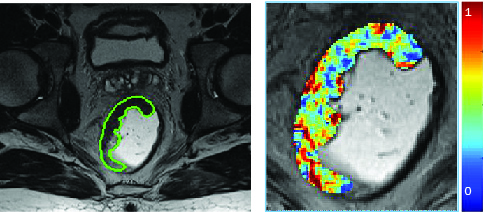Office of Research & Development |
 |


Diagnostic MRI scan of rectal cancer tumor (left) with AI visualization (right).
August 13, 2024
By Tristan Horrom
VA Research Communications
"Our group, as well as others, has demonstrated the potential for AI to capture specific aspects of the disease . . . This information could enable the wider use of targeted therapies and personalized interventions for cancer."
VA Cleveland researchers are putting artificial intelligence (AI) to work to improve rectal cancer diagnosis and find the best treatment options for Veterans. Work on the project began in July of 2024.
Lead researcher Dr. Satish Viswanath and his colleagues recently received VA Merit Award funding to create and AI algorithm to analyze MRI scans. The four-year study will take advantage of VA’s large data pool to optimize and validate the new tool, which could help Veterans with rectal cancer avoid invasive treatments and maintain the best quality of life. The researchers have already begun their analysis by starting with existing clinical MRI scans, which are routinely acquired during patient care.
Colorectal cancers are the third most common type of cancer in military personnel, affecting up to 8% of Veterans and 5% of active-duty Service members. More than 145,000 patients in the United States were diagnosed with colorectal cancer in 2023, with more than 46,000 of those cases localized to the rectum.
According to Viswanath, it is critical to address colorectal cancer in the Veteran population because “they are relatively underserved in this aspect and thus often suffer significantly worse comorbidities, stresses, and burdens, as well as potentially suffering worse outcomes compared to the general population.”
Surgery to remove the tumor is the go-to treatment for rectal cancer, but surgery comes with inherent risks and complications, including patients having a worse quality of life. Many patients experience fecal incontinence, the need for a colostomy bag, sepsis, sexual problems, and other complications. Conversely there are patients who need additional treatment post-surgery to minimize the chances of recurrence or metastasis. According to Viswanath, the field of colorectal cancer is moving in the direction of personalizing treatment protocols to each rectal cancer patient.
“Currently, rectal cancer patients undergo a one-size-fits-all treatment protocol. Thus, a number of patients suffer unnecessary comorbidities or end up being under-treated or over-treated due to a lack of clinically actionable, non-invasive markers that can be used to personalize treatment options,” explained Viswanath. “Our project directly addresses this critical need via AI, and could significantly improve the outcomes, overall survival, and quality of life of Veteran patients.”
Newer treatments, such as chemotherapy and radiation therapy, offer patients different options that may help them avoid these complications. Recent research has shown many patients can survive without aggressive treatment and would benefit from organ-preserving treatment strategies and non-operative management, such as a “watch-and-wait” approach, in which the cancer is closely monitored for problems but not surgically removed. This is especially true for Veterans, who tend to be older than other rectal cancer patients and therefore may have worse outcomes from surgery. However, not all patients respond to these treatments.
That’s where the new AI tool, called the computational image Rectal Response Classifier (ciRRC), comes in. The AI model can analyze MRI data quicker and more thoroughly than a human can using their eyes only, which can help determine whether a patient may be resistant to one treatment and more responsive to a different approach. It will help clinicians decide the best timing for administering chemotherapy based on tumor stage.
The first aim of the project is to identify high-risk Veterans who would benefit the most from targeted chemotherapy, based on how far advanced their tumors are and predicted resistance to chemoradiation. The second aim is to identify Veterans who can be safely recommended for non-surgery management because their tumors are smaller or shrinking. Finally, the researchers will conduct multi-institutional validation of the ciRRC tools across a large cohort of Veteran patients from multiple Midwest VA centers.
The hope is the ciRRC tool, once fully developed and tested, will allow doctors to offer patients customized precision oncology treatment.
Preliminary findings have shown the potential of AI to evaluate rectal tumors to determine the best course of treatment. The research team will apply these methods to a larger study sample to refine the computer model. According to Viswanath, AI shows promise not just for the treatment of rectal cancer, but of other cancers as well.
“Our group, as well as others, has demonstrated the potential for AI to capture specific aspects of the disease, which have proven hard to quantify thus far,” he said. “This information could enable the wider use of targeted therapies and personalized interventions for cancer.”
Viswanath also highlighted the importance of working at VA, the largest integrated health care system in the country, in conducting such important research.
“The VA research environment offers unique opportunities to rapidly have a massive impact in the Veteran population due to the wide-ranging network between VA centers, which can help in large-scale evaluation while also helping in deployment,” he explained. “VA is also at the forefront of large-scale population phenotyping, such as the Million Veteran Program, which promises to be a rich resource for AI development and validation.”
Personalizing cancer care is a cornerstone of VA’s Precision Oncology Program and the President’s Cancer Moonshot initiative. By leveraging the power of AI, Viswanath and his team hope to bring a powerful new tool to the fight against rectal cancer.
VA Research Currents archives || Sign up for VA Research updates